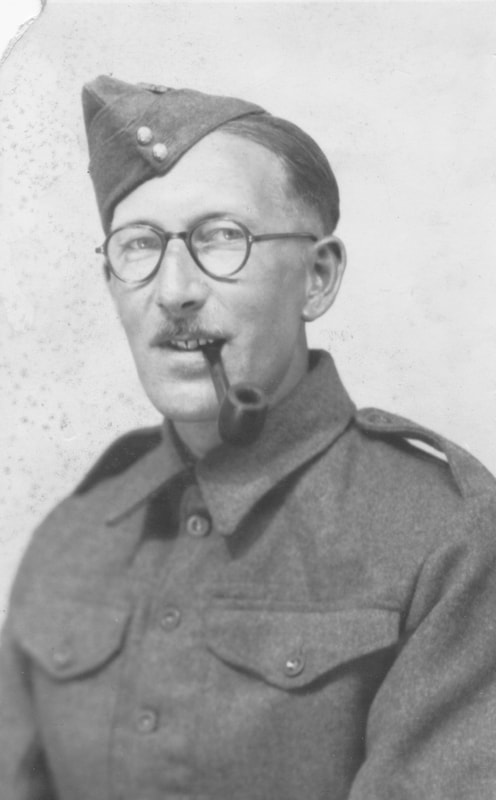|
The Colonel Says Goodbye
Margaret Wakefield (nee Lambert) December 2020 The boys of Box have lost their “Colonel”. That is the name by which Mr Philip Lambert is affectionately known to almost every boy in the village. In a space of a few years, he re-organised the Box Boy Scouts and made them into one of the smartest and most enthusiastic troops in the West Country. Mr. Lambert has now gone to war work in the Midlands and has given up his work as assistant sub-contractor in the Bath and Portland Stone Firms.[1] This was the announcement of my father’s departure from the village when, aged 32, he joined the Civil Service in 1940 as Chief Clerk and assistant to the Officer I/C R.E. (Royal Engineers) Stores in South Wales. He carried out this work for almost the remainder of the war mainly in Porthcawl, Cardiff and Llantrisant. He became fairly indispensable and his actual call-up to serve in the Corps of the Royal Engineers didn’t come until 27 June 1944. However, he did become a member of the Home Guard under the Civil Defence Duties (Compulsory Enrolment) Order, 1942 and after much training in fire-fighting, lectures on the effects of incendiary bombs and such-like, he served in several different companies wherever he was working at the time. Fortunately, he did not encounter any enemy action on the UK mainland. |
Phil met the young Mary Buckman during the year or so that he spent in Porthcawl. It was a time when young people were on the move, when life was uncertain and when emotions were heightened. They duly wed in 1943.
Phil embarked on a brief career on active army duty. On the day he set sail on the SS Pasteur for the Middle East, peace was declared in Europe on 8 May 1945. The forces in Europe then had the role of trying to establish peace and Phil travelled to Egypt, Palestine, Jordan, Iraq and Bahrain, enjoying the new sights, sounds and smells of hitherto unfamiliar countries. In the absence of hostilities, he took the opportunity to do a lot of sight-seeing, especially in the Holy Land and he played a lot of golf and football and saw a lot of films! He was sustained throughout with regular letters from friends and family in Box and especially from his new bride in Porthcawl with news of their developing young family.
As soon as Phil received his ‘B’ release notice in December 1945, he wrote to ask for a position back with the Bath and Portland Stone Firms, which was duly granted. He was very fortunate not to be in the position of so many returning Forces personnel after the end of hostilities who were then unable to find employment. He was welcomed back to the family fold with open arms, but then found that his new job necessitated him working in Portland where he was unable to find accommodation for the family, another common problem for people after the war. Eventually, by dogged perseverance and after several failed attempts, he secured a job ideally suited to his experience and capabilities in Chippenham. Now he was able to return with his new family to live in Box, the village that he knew and loved. Phil died in 1991, sorely missed in the village.
Phil embarked on a brief career on active army duty. On the day he set sail on the SS Pasteur for the Middle East, peace was declared in Europe on 8 May 1945. The forces in Europe then had the role of trying to establish peace and Phil travelled to Egypt, Palestine, Jordan, Iraq and Bahrain, enjoying the new sights, sounds and smells of hitherto unfamiliar countries. In the absence of hostilities, he took the opportunity to do a lot of sight-seeing, especially in the Holy Land and he played a lot of golf and football and saw a lot of films! He was sustained throughout with regular letters from friends and family in Box and especially from his new bride in Porthcawl with news of their developing young family.
As soon as Phil received his ‘B’ release notice in December 1945, he wrote to ask for a position back with the Bath and Portland Stone Firms, which was duly granted. He was very fortunate not to be in the position of so many returning Forces personnel after the end of hostilities who were then unable to find employment. He was welcomed back to the family fold with open arms, but then found that his new job necessitated him working in Portland where he was unable to find accommodation for the family, another common problem for people after the war. Eventually, by dogged perseverance and after several failed attempts, he secured a job ideally suited to his experience and capabilities in Chippenham. Now he was able to return with his new family to live in Box, the village that he knew and loved. Phil died in 1991, sorely missed in the village.
Reference
[1] Bath and Wilts Chronicle, Saturday January 6th 1940
[1] Bath and Wilts Chronicle, Saturday January 6th 1940
